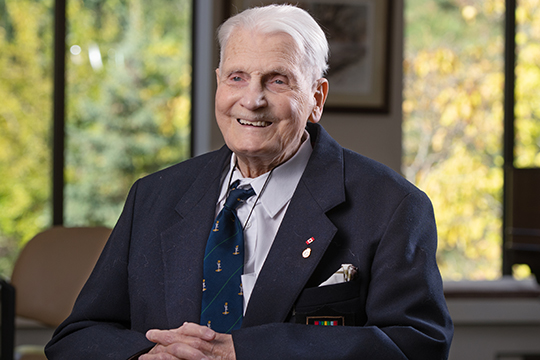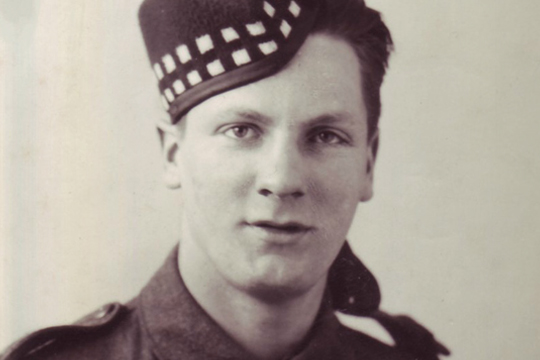
Adam Houston survived years in a Japanese PoW camp and just celebrated his 100th birthday.
As Adam Houston laid on the ground in a Japanese prisoner of war camp, with a guard known as “Golden Fang” beating him with a pick handle, kicking him and leaving him writhing in the dirt for hours, he was not thinking that he would live to be 100.
“Oh God, no,” Houston says from his retirement residence in Burlington, Ont. “That just crept up on me, one year at a time.”
It’s been almost eight decades since that brutal beating, and Houston is smiling and even chuckling as he recalls the moment — and a century of moments — during a video interview via Zoom. Not even a choppy Wi-Fi signal can throw him off. This is a man who long ago learned to literally roll with the punches — and with the kicks, bullets, missiles, bombs and diseases that nearly killed him as a young man.
He survived and returned to Scotland, emigrated to Canada, got a job with the post office and was the second member of the Hamilton Branch of the National Association of Federal Retirees, then known as the Federal Superannuates National Association.
Houston was born on May 22, 1921, in Selkirk, Scotland. He started work at age 14 and spent four years “tweeding in a tweed mill,” perhaps the most Scottish job a Scot could have. He went to school to study textiles, in a demonstration of what he would later describe in his war diary as a “keenness to learn.”
At 18, he joined the Territorial Army.
“You worked all day and your soldiering was evenings, weekends and holidays. It didn’t last too long because in September, of course, the war started,” he recalls, leaning into the computer screen to better hear the questions. “A few days before [British prime minister Neville] Chamberlain declared war, I was called to full-time service, in the King’s Own Scottish Borderers.”
He trained as a signalman, responsible for radio equipment and communications. Soon he was sent to Malaya (now Malaysia) and assigned to an anti-tank unit. They were in Singapore, and it was a grand adventure — until it wasn’t.
“When war came, it came without warning,” he wrote in his diary. “We were told that a convoy of Japanese ships had been sighted and that we must get north to take up our positions on the [Thai] border.”
On Oct. 2, 1942, he received a radio message: “There must be no thought of sparing the troops or civil population and no mercy must be shown to any weakness in any shape or form. Commanders and senior officers must lead their troops and, if necessary, (die) with them,” ordered Gen. Archibald Wavell.
Despite the general’s bluster, the Japanese had military superiority and within a month, the British and allied forces capitulated. Houston was quietly ordered to “fix” his radio so the approaching Japanese army couldn’t use it. “After I had been busy with a pair of pliers for five minutes,” he wrote, “it was extremely doubtful if the set would ever be successfully operated again.”
The prisoners camped in Changi after a forced march, during which they saw Malaysian prisoners slaughtered by Japanese soldiers. Soon, dysentery attacked. “I was one of the first unfortunates.” After two weeks in hospital, despite being many pounds lighter and still feeling poorly, a bed-shortage led to his discharge.
“I pinched a much-needed blanket and a mosquito net from the hospital and prepared myself to rejoin the lads,” he wrote, his jocularity intact. “The Japanese sergeant in charge could speak a little English, which had apparently been picked up from the cinema. He was much distressed when we told him that Deanna Durbin [the Winnipeg-born star of movie musicals] was dead.”

Adam Houston joined the Territorial Army in Scotland in 1939 and trained as a signalman.
After another forced march, they were crammed onto a Japanese “Hell ship,” an old steamer that had been refurbished for prisoner transport. “Each deck on this ship was divided in half, so we were packed in like on shelves,” Houston says. Each space was “about 50 inches high,” he thinks, and the voyage was a couple of weeks.' You just had about enough space to lie down,” he says. In his diary he wrote, “Into these holes, men were packed like old boots in a cupboard.”
On Nov. 14, they arrived in Taiwan (then Formosa), and after another forced march over a mountain they arrived at the Kinkaseki PoW camp near Taipei, and were set to work in a copper mine.
Houston wasn’t fully recovered from dysentery, but the Japanese foreman, or “honcho,” who was known as Golden Fang because of a prominent gold tooth, didn’t care.
“I wasn’t working hard enough, so on the lunch break, as the others were going back to work, he grabbed me and beat me with a pick handle. He left me on the floor and kicked me a few times. At the end of the shift, the other prisoners carried me up over the mountain and back into the camp.” Showing a knack for understatement, he adds, “It was quite a thing.”
He never saw the copper mine again. He was so sick and weak that he spent months in a coma in hospital and remained in medical care until after the war ended.
Houston spent 3 ½ years in the PoW camps, but by 1946 was home in Selkirk. He had a series of jobs — insurance agent, machinist, organizer for the Scottish Liberal party and more time in a tweed mill. Then he saw “an ad in the local papers, requesting people to come to Ontario.” So he got a plane ticket — he remembers the airline (KLM) and the cost (65 pounds) — and crossed another ocean. It was 1956. His wife, Agnes Cockburn Dunse, and their only child, Marion Elizabeth, joined him a year later.
“Her name was Dunse because her great-grandfather was a foundling,” Houston says. “He was found as a baby on the steps of the town hall in the town of Dunse.” He hastens to add that Agnes “was Scottish through and through.”
They’d met in 1946 at a fancy-dress ball hosted by her employer.
“I was telling this girl, ‘Nobody’s asked me to go to this ball’ and she said, ‘I’ll find somebody to take you.’ And the person she found turned out to be my wife. After the ball, I took Agnes home. She says, ‘You can kiss me if you like, but it doesn’t mean anything.” However, it must have meant something, because a couple of years later we got married.”
In Toronto, he got a job at the post office, working as a sorter. He worked up to supervisor while he studied three years for a public service certificate, and another three years in human resources, at what was then called Ryerson Polytechnical. When he retired in 1981, he was “a postal line manager level 5” at South Central in Toronto, he says, and he became vice-president of the Hamilton branch of Federal Retirees.
“We were just trying to get off the ground in those days. We used to try to make sure people got a lecture to join before they retired, because until we got the deduction from the pension cheques, we had to go around and collect the fees,” he says, and laughs heartily.
Agnes died six years ago, but not before she accompanied him back to Taiwan in 2005 for the opening of a “park of remembrance” where the copper mine used to be.
“They were very good to us,” he recalls. “That was quite a nice ceremony. What was a rotten camp, they made it into quite a nice park.” He’s now the last of the four survivors who were alive to make the return visit.
“We were well looked after, and the president of Taiwan insisted that the prisoners talk to him personally, so we got to meet him,” he says. “Then he paid for our lunch at the Grand Hotel. That was nice.”

